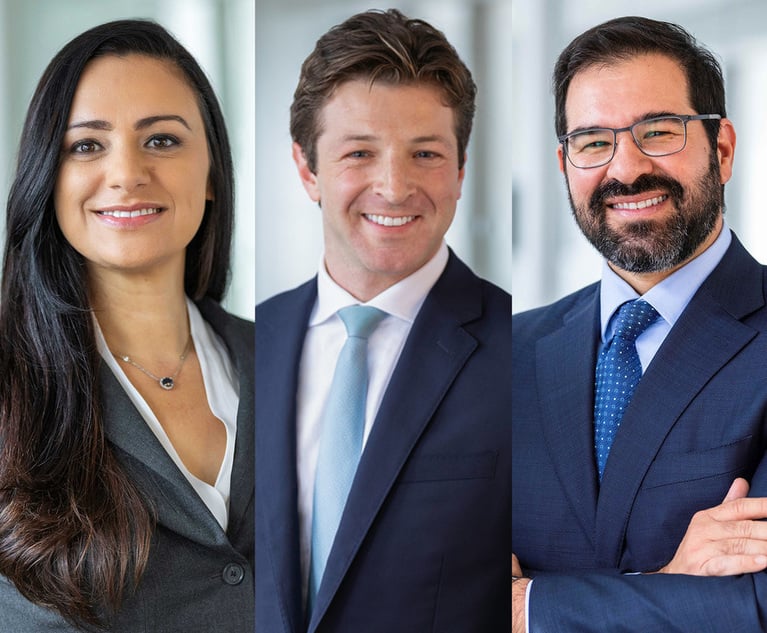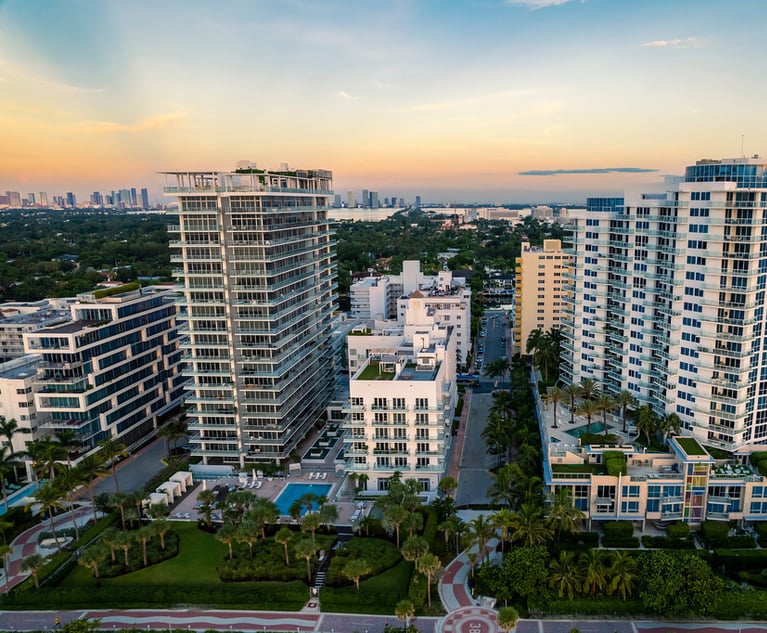State Appeals Court Digs Into Medical Marijuana Smoking Ban
But on the same day Ron DeSantis was sworn into office as governor, lawyers for the state tried to persuade a three-judge panel to uphold the smoking prohibition.
January 09, 2019 at 12:39 PM
5 minute read
 Marijuana/Credit: Fotolia
Marijuana/Credit: Fotolia
Newly minted Gov. Ron DeSantis has indicated he may drop the state's appeal of a court decision that said a Florida law banning patients from smoking medical marijuana is unconstitutional.
But on the same day the Republican successor to former Gov. Rick Scott was sworn into office, lawyers for the state tried to persuade a three-judge panel to uphold the smoking prohibition.
Tuesday's arguments at the First District Court of Appeal were the latest twist in a challenge to a 2017 law aimed at implementing a constitutional amendment that broadly legalized medical marijuana. More than 71 percent of voters approved the constitutional amendment in 2016.
Architects of the amendment, including Orlando trial lawyer John Morgan, filed the challenge because they said the prohibition on smokable marijuana runs afoul of the Constitution. Leon County Circuit Judge Karen Gievers in May agreed with the plaintiffs and struck down the ban, but her decision has been on hold after the state appealed.
Attorneys representing the Department of Health on Tuesday continued to defend the 2017 law, saying the constitutional amendment gives health officials the power to issue regulations and that the Legislature was right to ban smoking because of its ill effects.
“The amendment does not in any instance guarantee immunity for smoking marijuana,” Deputy Solicitor General Jordan Pratt said.
But appeals court Judge Timothy Osterhaus questioned the Legislature's authority to override the requirements of the amendment, which does not specifically authorize smoking.
“Do you think that's key here, that they didn't knock out all ways of administering … that they left ways open, or could they have decided that all ways are unsafe?” Osterhaus asked.
Pratt said the law allows for a variety of other methods of consumption and that lawmakers probably would not have been able to ban all types of administering the treatment.
“Is there harm to the voters writ large, if they've gone through the process of amending their Constitution, and the Legislature decides, 'No, we're not going to go for that and we're going to veto what you've passed?' ” Osterhaus asked.
The court's focus “begins and ends with just one question, which is whether the amendment requires smoking of marijuana,” Pratt said.
“And there's simply nothing in the amendment that says that,” he added.
But Jon Mills, a former dean of the University of Florida law school who helped craft the amendment, told the judges the 2017 law is in direct conflict with the Constitution.
The Constitution allows doctors to order smokable marijuana for eligible patients, but the law does not, Mills said.
“If you could prevent one method, could you prevent all,” Mills said, adding that is “not a small constitutional conflict.”
Whether smoking is bad for patients' health is not an issue, Mills maintained.
“If the constitutional boundaries are set, there are no set of circumstances or facts that justify violating the Florida Constitution,” he said.
Cathy Jordan, a plaintiff in the case, credits a daily regimen of smoking marijuana with keeping her alive decades after doctors predicted she would die from Lou Gehrig's disease. Jordan, who grows her own pot, testified last year that smoking marijuana treats a variety of life-threatening side effects of the disease and that other forms of ingestion don't have the same positive impact.
“Cathy Jordan is not trying to have a good time. She's trying to live. And what works for her is what she and her doctor agreed upon, and that was smoking,” Mills told the judges Tuesday. “There is a conflict. It's irreconcilable. And that really is the end of the story.”
While Scott's administration strenuously objected to allowing patients to smoke marijuana, DeSantis appears to have a different view.
Speaking to reporters on Monday, DeSantis said he has “not committed” to upholding the ban.
“I think at the end of the day, when the people speak on these things, we want to implement their will. I don't think that that's been done fully. So we are going to be taking actions with medical marijuana that are consistent with what I said in the campaign. It was a 72 percent issue, and I have different minds, from different people, about how effective it's going to be. But at the end of the day those debates are really before the vote happens, and once the vote happens, you've got to move on. So we'll take some actions within a pretty short time,” DeSantis said.
Dara Kam reports for the News Service of Florida.
This content has been archived. It is available through our partners, LexisNexis® and Bloomberg Law.
To view this content, please continue to their sites.
Not a Lexis Subscriber?
Subscribe Now
Not a Bloomberg Law Subscriber?
Subscribe Now
NOT FOR REPRINT
© 2025 ALM Global, LLC, All Rights Reserved. Request academic re-use from www.copyright.com. All other uses, submit a request to [email protected]. For more information visit Asset & Logo Licensing.
You Might Like
View All
Florida Law Schools Are Seeing a Bump in Applications for 2025, After Recent Declines at Flagship Schools
3 minute read
Florida Judge Denies Motion to Dismiss in $150M Plane Crash Lawsuit Involving Flow La Movie
3 minute read
Trending Stories
- 1State AG Hammers Homebuilder That Put $2,000-Per-day Non-Disparagement Penalty in Buyer Contracts
- 2Selendy Gay Files Lawsuit Challenging Trump's Workforce Reclassification EO
- 3Trump's DOJ Withdraws Opposition to Law Banning Trans Care for Minors
- 4Perkins Coie Backs Challenge to Trump's Ban on Transgender Military Service
- 5New Charges Expected in Sex Trafficking Case Against Broker Brothers
Who Got The Work
J. Brugh Lower of Gibbons has entered an appearance for industrial equipment supplier Devco Corporation in a pending trademark infringement lawsuit. The suit, accusing the defendant of selling knock-off Graco products, was filed Dec. 18 in New Jersey District Court by Rivkin Radler on behalf of Graco Inc. and Graco Minnesota. The case, assigned to U.S. District Judge Zahid N. Quraishi, is 3:24-cv-11294, Graco Inc. et al v. Devco Corporation.
Who Got The Work
Rebecca Maller-Stein and Kent A. Yalowitz of Arnold & Porter Kaye Scholer have entered their appearances for Hanaco Venture Capital and its executives, Lior Prosor and David Frankel, in a pending securities lawsuit. The action, filed on Dec. 24 in New York Southern District Court by Zell, Aron & Co. on behalf of Goldeneye Advisors, accuses the defendants of negligently and fraudulently managing the plaintiff's $1 million investment. The case, assigned to U.S. District Judge Vernon S. Broderick, is 1:24-cv-09918, Goldeneye Advisors, LLC v. Hanaco Venture Capital, Ltd. et al.
Who Got The Work
Attorneys from A&O Shearman has stepped in as defense counsel for Toronto-Dominion Bank and other defendants in a pending securities class action. The suit, filed Dec. 11 in New York Southern District Court by Bleichmar Fonti & Auld, accuses the defendants of concealing the bank's 'pervasive' deficiencies in regards to its compliance with the Bank Secrecy Act and the quality of its anti-money laundering controls. The case, assigned to U.S. District Judge Arun Subramanian, is 1:24-cv-09445, Gonzalez v. The Toronto-Dominion Bank et al.
Who Got The Work
Crown Castle International, a Pennsylvania company providing shared communications infrastructure, has turned to Luke D. Wolf of Gordon Rees Scully Mansukhani to fend off a pending breach-of-contract lawsuit. The court action, filed Nov. 25 in Michigan Eastern District Court by Hooper Hathaway PC on behalf of The Town Residences LLC, accuses Crown Castle of failing to transfer approximately $30,000 in utility payments from T-Mobile in breach of a roof-top lease and assignment agreement. The case, assigned to U.S. District Judge Susan K. Declercq, is 2:24-cv-13131, The Town Residences LLC v. T-Mobile US, Inc. et al.
Who Got The Work
Wilfred P. Coronato and Daniel M. Schwartz of McCarter & English have stepped in as defense counsel to Electrolux Home Products Inc. in a pending product liability lawsuit. The court action, filed Nov. 26 in New York Eastern District Court by Poulos Lopiccolo PC and Nagel Rice LLP on behalf of David Stern, alleges that the defendant's refrigerators’ drawers and shelving repeatedly break and fall apart within months after purchase. The case, assigned to U.S. District Judge Joan M. Azrack, is 2:24-cv-08204, Stern v. Electrolux Home Products, Inc.
Featured Firms
Law Offices of Gary Martin Hays & Associates, P.C.
(470) 294-1674
Law Offices of Mark E. Salomone
(857) 444-6468
Smith & Hassler
(713) 739-1250







